
James Henry Miller, better known by his stage name Ewan MacColl, was an English folk singer-songwriter, folk song collector, labour activist and actor. Born in England to Scottish parents, he is known as one of the instigators of the 1960s folk revival as well as for writing such songs as "The First Time Ever I Saw Your Face" and "Dirty Old Town".
"Scarborough Fair" is a traditional English ballad. The song lists a number of impossible tasks given to a former lover who lives in Scarborough, North Yorkshire. The "Scarborough/Whittingham Fair" variant was most common in Yorkshire and Northumbria, where it was sung to various melodies, often using Dorian mode, with refrains resembling "parsley, sage, rosemary and thyme" and "Then she'll be a true love of mine." It appears in Traditional Tunes by Frank Kidson published in 1891, who claims to have collected it from Whitby.

Eric Bogle is a Scottish-born Australian folk singer-songwriter. Born and raised in Scotland, he emigrated to Australia at the age of 25, to settle near Adelaide, South Australia. Bogle's songs have covered a variety of topics and have been performed by many artists. Two of his best known songs are "No Man's Land" and "And the Band Played Waltzing Matilda", with the latter named one of the APRA Top 30 Australian songs in 2001, as part of the celebrations for the Australasian Performing Right Association's 75th anniversary.
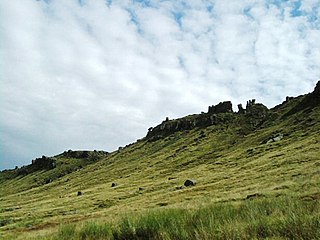
The mass trespass of Kinder Scout was a trespass protest at Kinder Scout in the Peak District, Derbyshire, England, on 24 April 1932. The protest sought to highlight that walkers were denied access to areas of open countryside which had been fenced off by wealthy landowners who forbade public access. It was organised by communist leader and Jewish anti-fascist Benny Rothman, the secretary of the British Workers' Sports Federation and a member of the Young Communist League.

The BBC Radio 2 Folk Awards celebrate outstanding achievement during the previous year within the field of folk music, with the aim of raising the profile of folk and acoustic music. The awards have been given annually since 2000 by British radio station BBC Radio 2.

Luke Kelly was an Irish singer, folk musician and actor from Dublin, Ireland. Born into a working-class household in Dublin city, Kelly moved to England in his late teens and by his early 20s had become involved in a folk music revival. Returning to Dublin in the 1960s, he is noted as a founding member of the band The Dubliners in 1962. Known for his distinctive singing style, and sometimes political messages, the Irish Post and other commentators have regarded Kelly as one of Ireland's greatest folk singers.

"Dirty Old Town" is a song written by Ewan MacColl in 1949 that was made popular by The Dubliners and The Pogues.

Margaret "Peggy" Seeger is an American folk singer and songwriter. She has lived in Britain for more than 60 years and was married to the singer-songwriter Ewan MacColl until his death in 1989.
"The Black Velvet Band" is a traditional folk song collected from singers in Ireland, Australia, England, Canada and the United States describing how a young man is tricked and then sentenced to transportation to Australia, a common punishment in the British Empire during the 19th century. Versions were also published on broadsides.
"Blackleg Miner" is a 19th-century English folk song, originally from Northumberland. Its Roud number is 3193. The song is one of the most controversial English folk songs owing to its depiction of violence against strikebreakers.
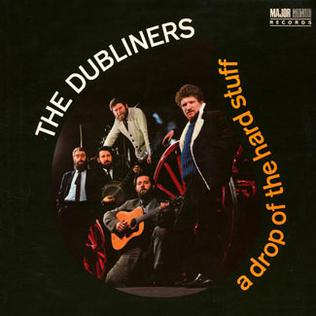
A Drop of the Hard Stuff is the debut studio album of the Irish folk group The Dubliners. It was originally released in 1967 on Major Minor Records. When it was reissued, it was renamed Seven Drunken Nights after the first track became a hit single. The album reached number 5 in the UK album chart, and stayed in the charts for 41 weeks. The album cover provides biographical sketches of the band line-up: Ronnie Drew, Luke Kelly, Barney McKenna, Ciarán Bourke and John Sheahan. "Limerick Rake" is sung unaccompanied. Most of the songs concern rogues and drinking. "Weila Waile" is a tragic murder ballad, sung with a certain jollity.
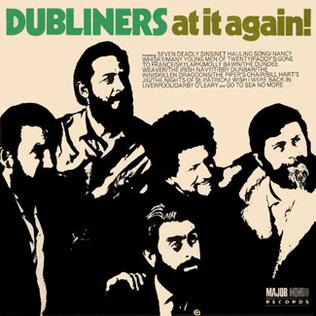
At It Again is a studio album by The Dubliners and was released on the Major Minor label in 1968. It featured "The Irish Navy", a satirical song with lyrics co-written by Ronnie Drew and Luke Kelly and set to music by John Sheahan. Barney McKenna and Ciarán Bourke also feature on the album. It was re-released under the title Seven Deadly Sins. The order of the tracks varies in different re-releases.
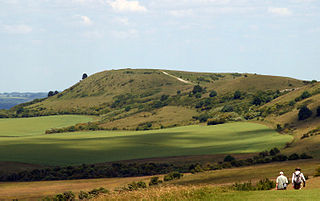
Walking is one of the most popular outdoor recreational activities in the United Kingdom, and within England and Wales there is a comprehensive network of rights of way that permits access to the countryside. Furthermore, access to much uncultivated and unenclosed land has opened up since the enactment of the Countryside and Rights of Way Act 2000. In Scotland the ancient tradition of universal access to land was formally codified under the Land Reform (Scotland) Act 2003. In Northern Ireland, however, there are few rights of way, or other access to land.
"The Road to the Isles" is a famous tune composed by Pipe Major John McLellan DCM which was originally called ‘The Bens of Jura’, though it previously had other titles. It is part of the Kennedy-Fraser collection and it appeared in a book entitled 'Songs of the Hebrides' published in 1917, with the eponymous title by the Celtic poet Kenneth Macleod. The poem is headed by the statement 'Written for the lads in France during the Great War'. The impression is given by the notes appended to the book that the author was Kenneth Macleod himself. Marjory Kennedy-Fraser toured the Western Isles of Scotland in the summer of 1917 and collected a group of local tunes. The tune associated with the Road to the Isles was an air played by Malcolm Johnson of Barra on a chanter and composed by Pipe Major John McLellan of Dunoon. Kenneth Macleod then wrote the words for a voice and harp arrangement of this air by Patuffa Kennedy-Fraser.

Patsy Watchorn is an Irish folk singer. He is notable for being a member of the Dublin City Ramblers and later The Dubliners.
"McCafferty" is an Irish ballad which originated as a street-ballad about British Army Private Patrick McCaffrey, executed in 1862 for the "fragging" of two officers. It is particularly popular in Ireland, where Pvt. McCaffrey came from, and was recorded by The Dubliners. In the British Army it was allegedly a court martial offence to sing the song, but that is a legend.
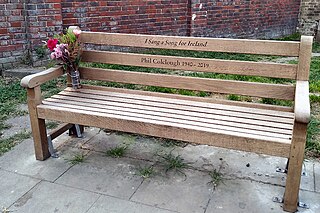
Phil Colclough was an English contemporary folk singer and songwriter. His best known works, co-written with his wife, June Colclough, are "Song for Ireland" and "The Call and the Answer".
"The Shoals of Herring" is a ballad, written by Ewan MacColl for the third of the original eight BBC Radio balladsSinging the Fishing, which was first broadcast on August 16, 1960. Ewan MacColl writes that the song was based on the life of Sam Larner, a fisherman and traditional singer from Winterton-on-Sea, Norfolk, England. Liam Clancy, who performed the song for decades, tells a more nuanced story, saying that MacColl "tape recorded all the old fisherman up along the east coast of England. And he never used one word of his own. ... He rhymed the lines that the fishermen had given him, and he made it into a song..."

Jack Warshaw is an American folksinger, songwriter and musician, best known for his 1976 protest song "If They Come in the Morning," aka "No Time for Love." He moved to England in 1965 to start a career as an architect but stayed because the folk music scene and the Vietnam War intervened.














